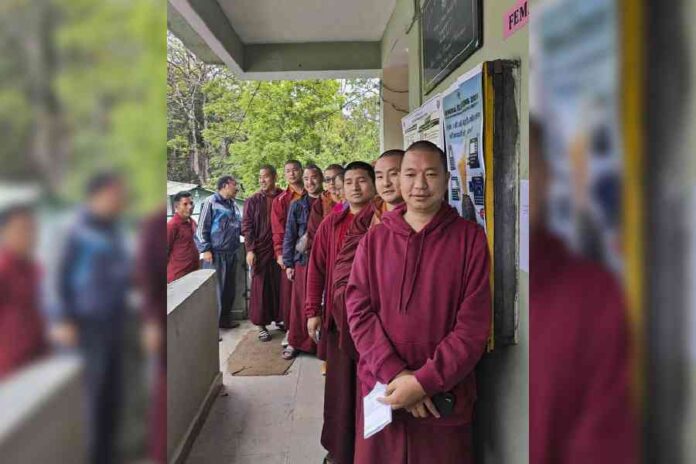In the serene landscape of Sikkim, nestled amidst the majestic Himalayas, lies a profound legacy that transcends time and space. Here, in the heart of the mountains, amidst monasteries and stupas, reside the custodians of an ancient tradition — the revered nuns and monks who embody the essence of spirituality and wisdom. As Sikkim goes to the polls, these spiritual guardians step forward not just as citizens but as torchbearers of a 300-year-old legacy, voting to reaffirm and perpetuate a tradition that is as old as the hills themselves.
Sikkim’s rich cultural tapestry is interwoven with the threads of Buddhism, which has flourished in the region for over a millennium. At the heart of this spiritual realm are the monastic communities, where nuns and monks devote their lives to the pursuit of enlightenment and the service of humanity. Rooted in the teachings of Lord Buddha, their existence is a testament to the enduring power of faith and the transformative potential of inner peace.
The decision of Sikkim’s nuns and monks to participate in the electoral process is not merely a civic duty but a reaffirmation of their commitment to the principles of democracy and social responsibility. In a world often plagued by conflict and discord, these spiritual guardians offer a beacon of hope, advocating for harmony and compassion in both word and deed.
For centuries, the monastic institutions of Sikkim have served as centers of learning and enlightenment, preserving ancient scriptures and disseminating timeless wisdom to all who seek it. Today, as they cast their votes, the nuns and monks carry with them the weight of history, mindful of their role as stewards of a legacy that stretches back through the annals of time.
The decision to participate in the electoral process is not without its complexities. For these spiritual seekers, whose lives are dedicated to the pursuit of inner truth, the realm of politics may seem distant and mundane. Yet, they recognize that the welfare of society is intricately intertwined with the workings of governance, and that their voices, too, must be heard in the corridors of power.
Moreover, the act of voting is imbued with profound symbolism for the nuns and monks of Sikkim. It is a gesture of solidarity with their fellow citizens, a tangible expression of their commitment to the welfare of the community at large. By participating in the electoral process, they affirm their role as active participants in the democratic fabric of the nation, bridging the gap between the spiritual and the secular realms.
At the same time, the decision to vote is also a deeply personal one for many nuns and monks, reflecting their individual aspirations and convictions. While some may choose to align themselves with specific political ideologies or candidates, others may prioritize issues such as social justice, environmental conservation, or the preservation of cultural heritage.
Regardless of their individual preferences, however, what unites Sikkim’s nuns and monks is their unwavering commitment to the greater good. In a world fraught with division and discord, they stand as beacons of unity and compassion, reminding us of the inherent dignity and worth of every human being.
As the electoral process unfolds in Sikkim, let us pause to honor the contributions of these spiritual guardians, whose silent prayers and selfless service sustain the soul of the nation. In their hands lies not just the future of a state but the destiny of a people, guided by the timeless wisdom of the ages.
In addition, the decision of Sikkim’s nuns and monks to participate in the electoral process is a reaffirmation of their commitment to the principles of democracy and social responsibility. As they cast their votes, they carry with them the weight of history and the hopes of generations yet unborn, ensuring that the flame of enlightenment continues to burn brightly in the land of the thunder dragon.



